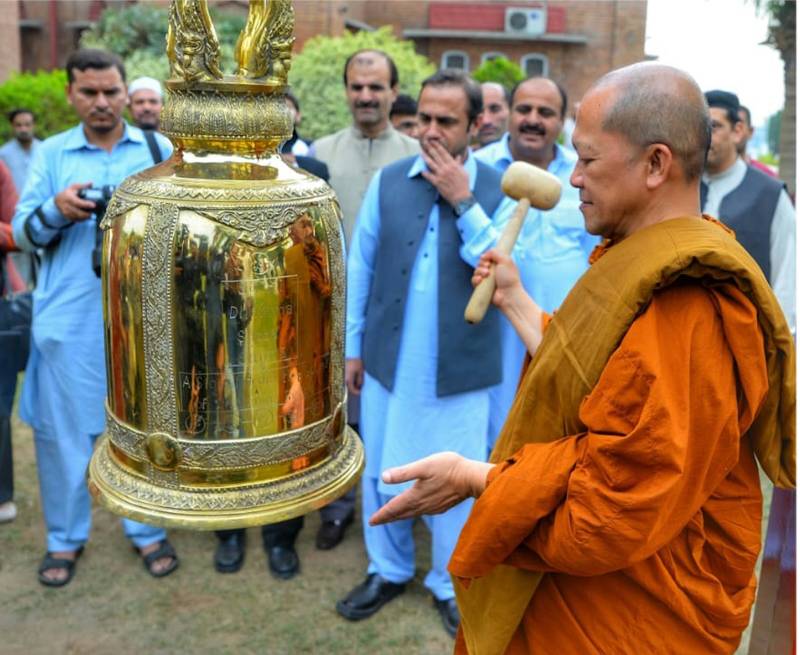
PESHAWAR: A high-ranking monk from Thailand, The Most Venerable Arayawangso, has visited Khyber Pakhtunkhwa (KP) to see archaeological sites associated with the Buddhist faith, located in various districts of the province.
For centuries, modern-day Khyber-Pakhtunkhwa was at the heart of the Gandhara civilization – a region of predominantly Buddhist beliefs and cultural practices. Buddhism remained the predominant faith in this region encompassing modern-day Pakistan and Afghanistan until at least the 8th or 9th centuries AD, when Muslim conquests and proselytizing gained momentum.
According to the Director of Archaeology for KP province, Dr. Abdul Samad, the Pakistani government's efforts to boost religious tourism have started yielding results as The Most Venerable Arayawangso visited the ancient Buddhist sacred site of Takht-i-Bahi. Situated in modern-day district Mardan, this site is associated with the ancient Indo-Parthian peoples.
The high-ranking Thai monk also visited the Peshawar Museum where he inaugurated the “Bell of Peace” and performed religious rituals. He rang the bell in hopes of promoting peace and goodwill between the peoples of the region. The Buddhist delegation were also briefed about the history of the museum itself.
The Most Venerable Arayawangso went on to visit other Buddhist holy sites in the province to perform religious rituals there. These sites are situated in the districts of Swat, Buner, Mardan, Peshawar and the erstwhile tribal districts.
Authorities took all possible steps to provide security for the Buddhist spiritual leaders and faciliate them in their visit to various parts of the province.
Speaking on the occasion, Director of Archaeology for KP, Dr. Abdul Samad, offered the delegation an overview of the Buddhist holy sites in the province. He noted that there more than 2,000 such sacred sites around KP. He emphasized that Pakistani authorities have been working to preserve and promote all archaeological sites in the province for a long time now.
Dr. Abdul Samad expressed his appreciation for the Buddhist leaders' visit. He hopes their visit would promote harmony and bring about an increase in religious tourism to Pakistan.
“By promoting religious tourism,we will send a message to the world that Pakistanis respect other religions and wish for peace” he hoped
For centuries, modern-day Khyber-Pakhtunkhwa was at the heart of the Gandhara civilization – a region of predominantly Buddhist beliefs and cultural practices. Buddhism remained the predominant faith in this region encompassing modern-day Pakistan and Afghanistan until at least the 8th or 9th centuries AD, when Muslim conquests and proselytizing gained momentum.
According to the Director of Archaeology for KP province, Dr. Abdul Samad, the Pakistani government's efforts to boost religious tourism have started yielding results as The Most Venerable Arayawangso visited the ancient Buddhist sacred site of Takht-i-Bahi. Situated in modern-day district Mardan, this site is associated with the ancient Indo-Parthian peoples.
The high-ranking Thai monk also visited the Peshawar Museum where he inaugurated the “Bell of Peace” and performed religious rituals. He rang the bell in hopes of promoting peace and goodwill between the peoples of the region. The Buddhist delegation were also briefed about the history of the museum itself.
The Most Venerable Arayawangso went on to visit other Buddhist holy sites in the province to perform religious rituals there. These sites are situated in the districts of Swat, Buner, Mardan, Peshawar and the erstwhile tribal districts.
Authorities took all possible steps to provide security for the Buddhist spiritual leaders and faciliate them in their visit to various parts of the province.
Speaking on the occasion, Director of Archaeology for KP, Dr. Abdul Samad, offered the delegation an overview of the Buddhist holy sites in the province. He noted that there more than 2,000 such sacred sites around KP. He emphasized that Pakistani authorities have been working to preserve and promote all archaeological sites in the province for a long time now.
Dr. Abdul Samad expressed his appreciation for the Buddhist leaders' visit. He hopes their visit would promote harmony and bring about an increase in religious tourism to Pakistan.
“By promoting religious tourism,we will send a message to the world that Pakistanis respect other religions and wish for peace” he hoped
